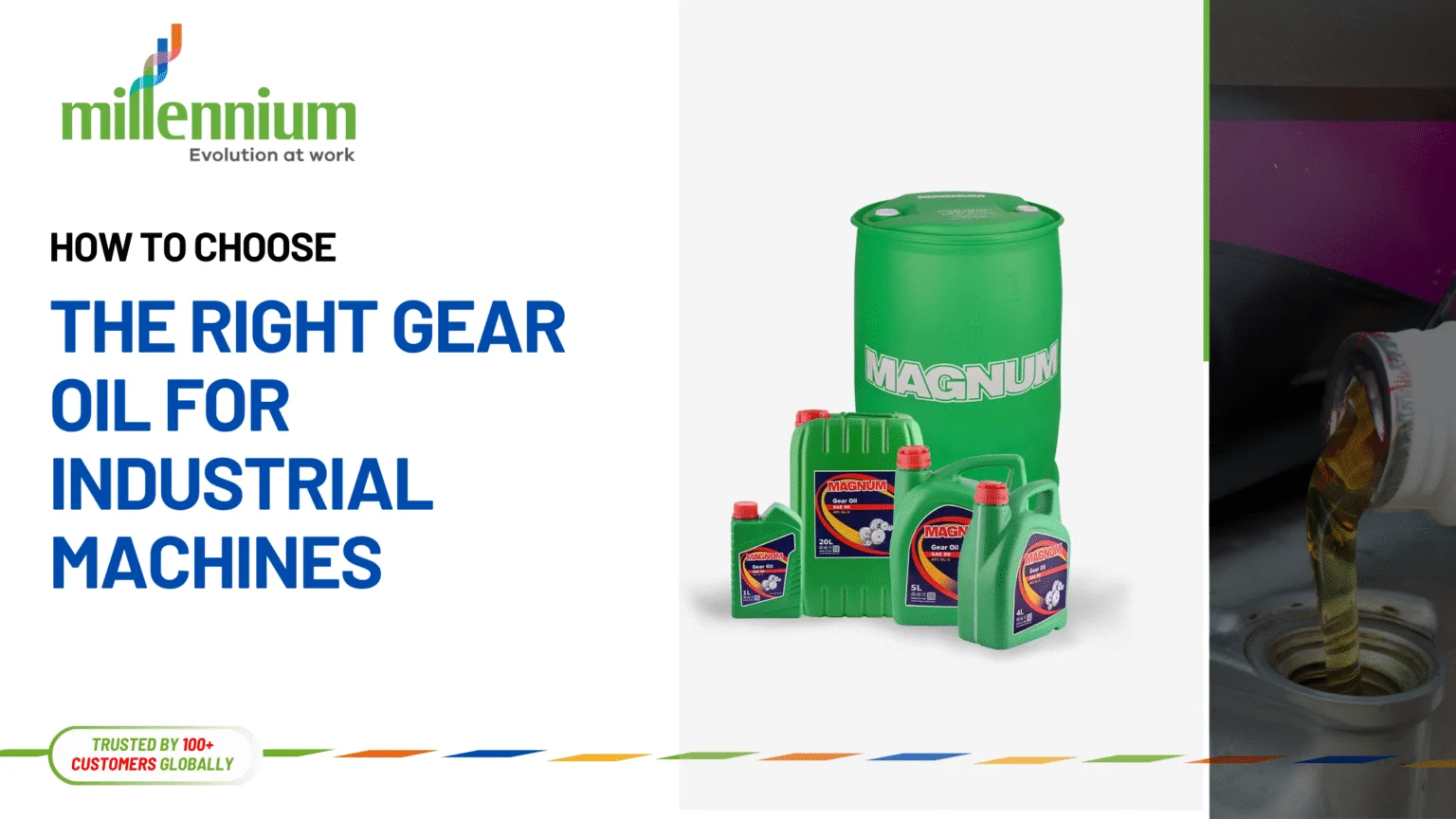Why Gear Oil Deserves More Attention Than It Gets
In industrial environments, machines operate under extreme conditions—high loads, fluctuating temperatures, and continuous motion. Yet, one of the most critical components that ensures their smooth functioning often goes unnoticed: gear oil. Gear oil is more than just a lubricant—it’s the lifeblood of mechanical systems that rely on gears for power transmission. Its role extends beyond reducing friction; it protects metal surfaces from wear, prevents corrosion, dissipates heat, and ensures optimal energy efficiency.
However, gear oil selection is often treated as a routine maintenance step rather than a strategic decision. Using the wrong lubricant can lead to gear pitting, excessive noise, overheating, and even catastrophic failure. On the other hand, choosing the right gear oil enhances performance, extends equipment life, and reduces downtime and maintenance costs. Understanding its importance and the factors influencing its selection can make a significant difference in long-term operational efficiency.
Types of Gear Oil
Gear oils are formulated with a combination of base oils and specialized additives that determine their performance characteristics. Broadly, they can be classified into several categories based on their composition and intended application:
- Mineral Gear Oils:
These are derived from refined petroleum and are commonly used in standard industrial applications. Mineral oils are cost-effective and suitable for moderate temperature and load conditions. However, they may oxidize faster under high temperatures and require more frequent oil changes. - Synthetic Gear Oils:
Made from chemically engineered base fluids, synthetic gear oils offer superior performance in extreme environments. They exhibit excellent thermal stability, oxidation resistance, and low-temperature fluidity. These properties make them ideal for heavy-duty applications, high-speed gearboxes, and operations requiring long oil life. - EP (Extreme Pressure) Gear Oils:
These contain special additives, often sulfur-phosphorus compounds, that form a protective film on metal surfaces under heavy loads. EP gear oils are perfect for applications where gears are subjected to shock loading, such as in mining, steel, or heavy manufacturing industries. - Non-EP Gear Oils:
Suitable for applications that do not experience extreme pressures, non-EP oils are often used in light machinery or systems where EP additives might react adversely with certain metals like copper or bronze. - Food-Grade Gear Oils:
Used in food and beverage processing machinery, these lubricants comply with NSF H1 standards and are formulated with non-toxic ingredients to prevent contamination. - Biodegradable Gear Oils:
These environmentally friendly lubricants are used in industries where oil leakage could harm the ecosystem, such as marine operations or forestry equipment.
Each type of gear oil serves a specific purpose, and understanding these distinctions helps narrow down the right choice for your equipment.
How to Choose Gear Oil According to Load and Speed
Selecting the right gear oil isn’t just about matching viscosity grades—it requires considering operating load, speed, temperature, and environmental conditions.
- Load Conditions:
- Heavy Loads: When machines operate under high torque or shock loading, a gear oil with Extreme Pressure (EP) additives is essential. These additives prevent surface welding and pitting, ensuring smooth gear engagement.
- Moderate Loads: For moderate industrial use, a high-quality anti-wear (AW) or standard mineral-based oil may suffice.
- Light Loads: In low-torque applications, using a lighter viscosity oil minimizes frictional losses and improves energy efficiency.
- Speed of Operation:
- High-Speed Gears: Require lower viscosity oils that minimize drag and reduce heat buildup. Synthetic gear oils are often preferred because they maintain consistent film strength even at high speeds.
- Low-Speed or High-Torque Gears: Benefit from higher viscosity oils that can maintain a strong lubricating film under heavy contact pressures.
- Operating Temperature:
- High-Temperature Environments: Synthetic oils with high oxidation stability are best suited, as they resist degradation and sludge formation.
- Low-Temperature Conditions: Gear oils with good pour-point characteristics ensure smooth startup and proper lubrication even in cold weather.
- Type of Gear System:
- Worm Gears: Require oils with high film strength and anti-scuffing properties due to sliding contact.
- Helical and Spur Gears: Can use standard EP oils since they operate with rolling motion.
- Bevel Gears: Benefit from lubricants that handle both sliding and rolling friction efficiently.
- Manufacturer Specifications:
Always consult the machine manufacturer’s recommendations regarding oil viscosity (ISO VG grades like 68, 100, 220, 320, etc.) and type. Following these guidelines ensures compatibility with materials, seals, and gear design.
MAGNUM Gear Oils: Perfect Fit for Industrial Machines
When it comes to ensuring maximum protection and performance gear oil for industrial machines, MAGNUM Gear Oils stand out as a trusted choice. Designed using advanced formulation technology, MAGNUM gear oils are engineered to meet the demanding requirements of modern machinery operating under severe conditions.
Key Features of MAGNUM Gear Oils:
- Superior Wear Protection: The specially formulated EP additives prevent metal-to-metal contact, minimizing gear wear even under shock loads.
- Outstanding Thermal and Oxidation Stability: MAGNUM oils maintain viscosity and performance over long operating hours, reducing oil degradation and extending service life.
- Excellent Rust and Corrosion Resistance: Protects internal components from moisture and contaminants, ensuring longer equipment life.
- Smooth and Silent Operation: The high film strength ensures quieter gear performance and less vibration.
- Extended Drain Intervals: Reduced oxidation and thermal breakdown allow for longer maintenance intervals, lowering operational costs.
MAGNUM gear oils are available in mineral and synthetic variants to suit diverse industrial needs—from heavy-duty manufacturing and mining machinery to precision equipment requiring clean, stable lubrication. Their high performance under pressure and wide temperature stability make them ideal for gearboxes, bearings, and enclosed gear drives across industries.
Final Thoughts
Choosing the right gear oil is not just a maintenance decision—it’s an investment in the longevity and efficiency of your industrial machines. By understanding the nature of gear oils, evaluating your operational load and speed requirements, and opting for a reliable brand like MAGNUM Gear Oils, you ensure smoother operations, reduced downtime, and greater energy efficiency.
In today’s competitive industrial landscape, where productivity and reliability matter most, the right gear oil can be the difference between consistent performance and costly breakdowns.




